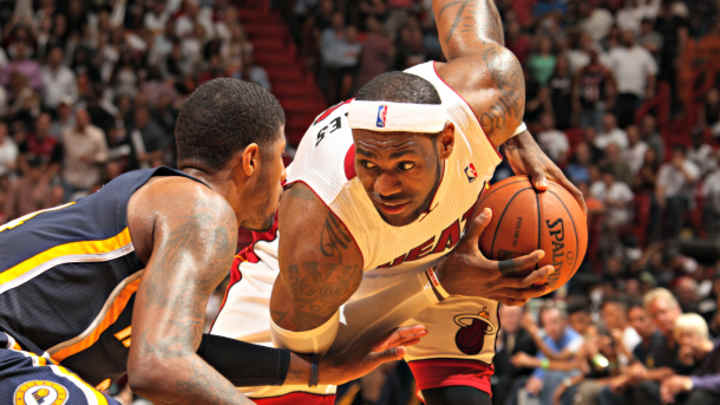Three-Pointers: Heat push struggling Pacers deeper into downward spiral

LeBron James got the best of Paul George and the Pacers on Friday. (Issac Baldizon/NBAE via Getty Images)

The race for the No. 1 seed in the East isn't quite over, though Miami pulled back into command of the spot with a decisive 98-86 win over Indiana on Friday. That the defending champs did so without Dwyane Wade (hamstring) in the lineup should make clear just how far the Pacers have fallen; nothing is working for an Indiana team that has won just three of its last 11 games -- two of which came by a combined three points. This is a culmination of deeper-set troubles that have plagued the Pacers for months, many of which the Heat exploited on Friday to great effect.
• A third-quarter surge set the Heat apart. Through 24 minutes these two Eastern Conference finalists had played each other to within a single possession on the scoreboard. From there Indiana unraveled completely; four and a half minutes of stout defense and quick turnarounds in transition helped the Heat forge an easy 16-0 run -- an unscalable mountain for a team as offensively challenged as these Pacers. Every would-be counter was turned inside out by forced shots or silly mistakes, both Indy hallmarks in 2014.
With no time to slow the Heat fast break and reduce the game to a grind, those errors were in full view. That brief stretch bore nine of Miami's 18 fast break points for the game. It gave LeBron James (36 points on 20 shots, six rebounds) the freedom of the open court, where if he didn't score or draw a foul he managed to attract enough attention that another Heat player could scoop up the offensive rebound. The Pacers wouldn't lose this game for another quarter and change, though it was then -- in their scoreless fury and that Miami flurry -- that they were beaten.
As a reminder: Pacers coach Frank Vogel rested his starters for this. He sat his team's five best players in Wednesday's game so that they might regroup mentally and physically. They responded by getting blown out in their time together on the floor, victims of a 41-point efficiency differential (per 100 possessions) in 21 minutes. George Hill went shotless and scoreless in 36 minutes. Roy Hibbert was held to five points and one rebound by the 6-8 Udonis Haslem (11 points, nine rebounds). Even Lance Stephenson was unbelievably silent, his most notable plays for the evening coming in his four turnovers. The proud, brutally effective team that obliterated the league in November and December is now gone. This is what one of the best lineups in basketball has been reduced to: A stifled, ineffective five-man unit swelling to the brim with discontent.
• Roy Hibbert's low-post struggles are not his alone. Off the top: There is absolutely no excuse for a player of Hibbert's size and strength to grab just a single rebound in extended minutes against an undersized Heat team. He's playing utterly vacant basketball at the moment, with which the Pacers and their fans have every right to be frustrated.
But assigning blame for Hibbert's few points and shot attempts is a more complicated endeavor. Of the looks that Hibbert did get he should have made more; his ability to establish deep position against smaller Miami defenders is a pivot point in this matchup, crucial given Indiana's stylistic insistence on running bigger lineups at all times. Yet there's only so much that can be done when Hibbert's teammates are throwing him such laughably poor entry passes. He doesn't get many post-up opportunities as it is -- strangely few, really, given that the Pacers claim to to work from the inside out. Then, when Hibbert's teammates finally do look to establish him down low, a shocking percentage of their interior feeds are darts thrown to the seven-footer's ankles or slow lobs served up for theft or deflection.
So much of posting up is well beyond the control of the player actually working from the block. Hibbert could have done better to seal his man down low or establish position more quickly. Yet resentment tends to build when these errors in connection and communication extend over time, as they clearly have with the Pacers. There may be a degree of selfishness in play, as Hibbert himself claimed in late March. On a broader level, though, this team just doesn't have the offensive discipline to get the ball where it needs to go.
• Without Dwyane Wade, Miami's LeBron-less offense goes adrift. The Heat were designed as a top-heavy team reliant on a unique combination of three stars. One of those stars (Wade) is absent with a hamstring injury. One other (James) needs to catch his breath from time to time, given that he essentially runs point, acts as his team's primary scorer and guards the opponent's top perimeter threat on a nightly basis.
Why, though, when James and Wade are both out of the lineup for Miami, is Chris Bosh utilized as if he were just another player? Miami had an All-Star big man lined up against the defenseless Luis Scola for minutes at a time on Friday. Rather than feature him in a post set or as a high pick-and-roll target, the Heat operated ad lib through Ray Allen, Norris Cole and Rashard Lewis. The results were as dreadful as you would expect: Miami converted just 28 percent of its field goals when LeBron was out of the game despite largely working against second-unit types. This wasn't the mighty Indiana defense locking up Miami's ill-equipped support staff, but a Heat offense that willingly shackled itself by going away from its most capable scorer.
